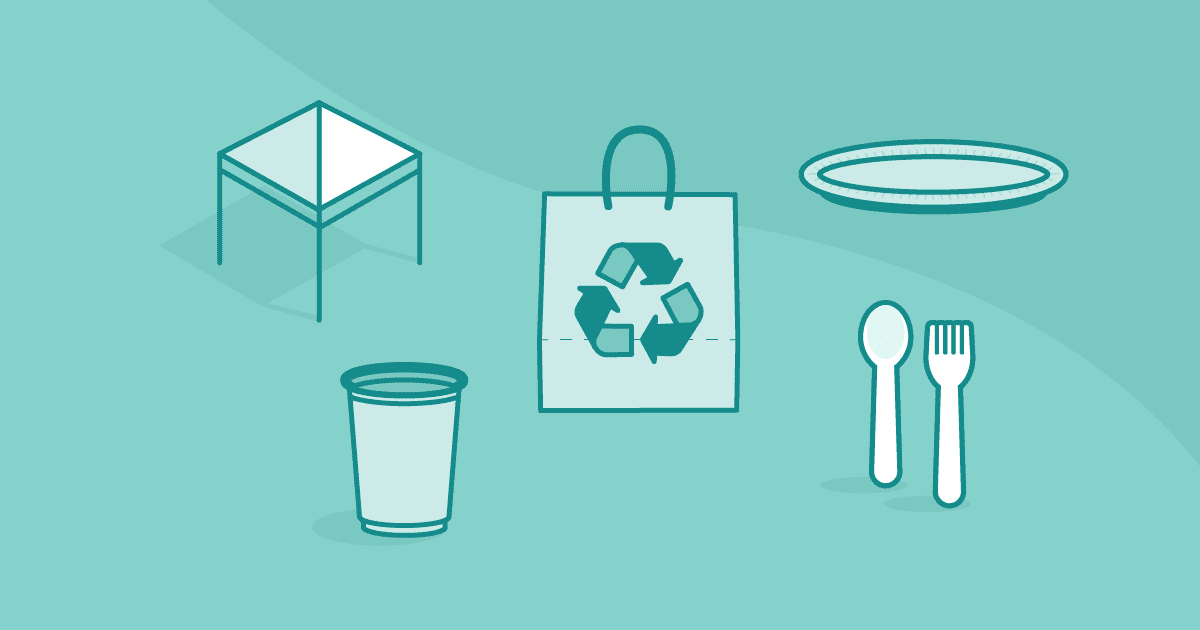More often, event planners wonder how to create a sustainable event. It can seem like the whole process has to be rethought, which is understandably intimidating. Beginning event planners may have an easier time adapting, but pros can quickly master eco-friendly event planning.
The answer to how to make your event sustainable is a lot simpler than you think! Just a few adjustments will transform every event into a sustainable sensation! Not only will you help the environment and boost your brand reputation, but sustainable event planning can help you save money by minimizing unnecessary expenses.
We’ve divided our guide to eco-friendly event planning into five major categories. Tackling sustainability is no different from any other event—it just requires a bit of organization! Work through these simple steps, and before you know it, you’ll be an eco-friendly master.
Build an eco-friendly network.
As anyone who’s trying to start a gym habit knows, it’s easier to meet your goals when you have an accountability buddy. The first step to mastering sustainable event planning is to make it a guiding principle in your network building.
Creating an eco-friendly team makes sustainability easier by leveraging pre-existing initiatives. Venues, vendors and suppliers who prioritize eco-friendly practices set your event up for sustainable success. LEED-certified buildings meet the global standard for green design, including energy-efficient measures that boost your event’s sustainability.
Successful eco-friendly events require everyone’s help. After all, recycling bins are only helpful if attendees use them. Weave sustainable messaging through your event storytelling. Include it on invites, emails, and promo materials. The more sustainability feels like the core of your event experience, the more likely attendees will join in.
Have presenters include sustainable messaging in their speeches and demonstrations to reaffirm the core mission of your event experience. Clear, regular communication of your eco-friendly initiatives will keep it front of mind for all attendees.
We’re only as effective as our community. Building a network of eco-friendly suppliers, vendors, and attendees will make sustainability a natural bi-product.

Reduce, reuse, and rethink your waste.
Say it with me: reduce, reuse, recycle! This is more than a catchy phrase. It tells you the order in which you should prioritize each tactic. Start by reducing the need for non-sustainable materials. An excellent example is digital venue maps and invitations that eliminate unnecessary printed materials.
Next, find ways to reuse materials from previous events or rent reusable decor. One savvy strategy is to design direction signage that can be reused from event to event with minor changes made using Velcro attachments.
If all else fails, recycle! Prioritize recycled or sustainably sourced materials for event decor, signage, catering, and event-related supplements like informational pamphlets. Again, digitize these wherever you can, but when all else fails—recycle.
Make waste management intuitive by placing recycling, composting and trash bins throughout the venue in visible and easy-to-access areas. Include signage clearly stating what materials can be composted or recycled (and ensure this signage is sustainable).

Sustainable catering.
Event catering is one of the biggest culprits of environmental damage. Working with eco-friendly catering companies that already have sustainable initiatives in place will set you up for success. But what does sustainability mean when it comes to catering?
Well, several things. First, you should prioritize local, seasonal, and organic foods. Working with local vendors eliminates transportation costs and the emissions associated with them. It also gives you an excuse to expand your network of eco-friendly partners.
While seasonal foods are usually more fresh, they’re more likely to be grown with sustainable farming practices. The same is true for organic foods grown without harmful chemicals. Choose catering companies that use these foods to give attendees a healthy, eco-friendly catering experience.
The type of food you serve can significantly impact sustainability. Opting for plant-based foods instead of meat will reduce your event’s carbon footprint. Plant-based foods require fewer resources to produce, making them eco-friendly.
Lastly, use sustainable plating options to minimize waste, such as recyclable or reusable plates, forks, knives, etc. If you want to go the extra mile with sustainable catering, organize a food donation program to avoid wasting leftover food.
Eco-friendly transportation.
This one’s tricky. While you won’t be able to eliminate the environmental impact of transportation, there are ways to minimize it. Finding an event venue that is centrally located with ample public transport options will set the stage for sustainable transport to, from, and during the event.
Hosting your event experience in a hotel will prevent attendees (most, at least) from traveling to and from their lodgings. If this isn’t possible, then find nearby lodgings that maintain sustainable practices to ensure you’re supporting eco-friendly companies.
The easier it is for attendees to use public transport instead of Uber, the more likely they will choose it. Include public transport information in your welcome emails and updates so attendees know how to best align with your sustainable goals.
Another simple but effective method for reducing carbon emissions is to provide a fuel-efficient or electric shuttle service to ferry attendees to and from the event space. Alternatively, encourage attendees to carpool or rideshare. This will minimize the number of cars on the road while fostering greater community bonding.
Use tech to boost sustainability.
The modern world of event technology has opened up new possibilities for sustainable event planning. As technology advances, planners can eliminate more waste while streamlining the event experience for attendees.
One spectacular example is on-site badge printing. Badges are a must-have for event experiences. They provide personal information to help attendees network and identify staff members. While they’re necessary, they don’t have to damage the environment.
Eliminate pre-printed badges and plastic badges by printing on-demand. It’s a win-win: you print only what you need, and on recyclable paper for a sustainable touch. Make your event greener with this simple step. Switch to on-site badge printing today!
Event apps are another tool planners can use to eliminate waste. As digital alternatives, venue maps, informational packets and keynote supplements can be held on an event app. But that’s not all! Event apps can use attendee data to assist networking and provide a platform for contact collection, minimizing the need for paper or plastic business cards.
A new way forward.
What is sustainable event planning? It’s a new approach to traditional organizing that prioritizes eco-friendly practices. In a way, it’s no different from what you’ve been doing! A few simple adjustments will transform your event experiences into sustainable sensations.
Break eco-friendly event planning into categories to make it more manageable. Label which areas you can reduce, reuse, and recycle. Creating an eco-friendly network of sustainability partners will make this task significantly easier.
Sustainable category checklist
- Marketing materials
- Sustainable partnerships
- Event catering
- Event decor & layout
- Venue (energy, water use, waste)
- Transportation & lodgings
By the time you reach the bottom of the list, you’ll have an eco-friendly event that attendees will love! While it feels good to help the environment, you’ll also reap the reputational benefits. Your brand will be seen as a caring, considerate team of event professionals.
So, what is sustainable event planning? It’s a new way forward!






